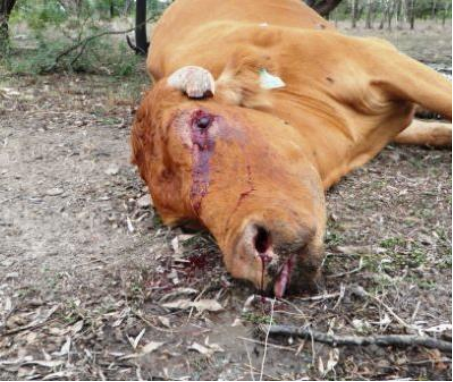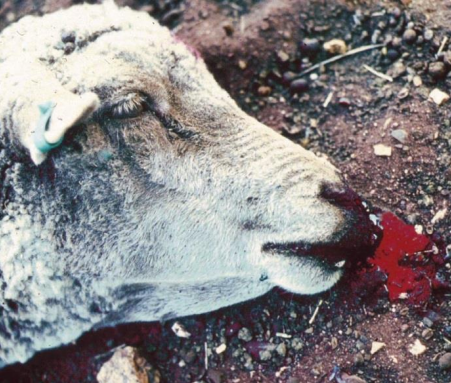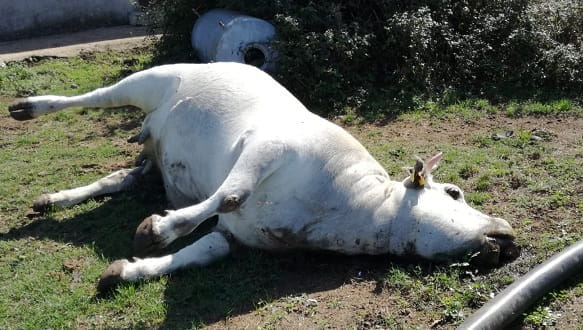What is Anthrax?
Anthrax is a serious infectious disease caused bacterial spores that can affect a range of animals, as well as humans. It is important producers are aware of the signs of anthrax to ensure a rapid response to an outbreak.
Anthrax has occurred sporadically in Australia for over 150 years. It’s known to have spread along old stock routes through central NSW into northern Victoria. Most recently, there was a confirmed case of Anthrax occurring near Swan Hill in February 2022.
How Does Anthrax Spread?
The bacteria, Bacillus anthracis, forms spores that persist in the soil for decades. Soil, hair, hides and wool are also possible areas for spores to exist, particularly processed skins and hides of infected animals.
Anthrax spores are usually disrupted by earthworks, heavy rain or deep grazing, particularly over summer months when stock graze closer to the ground.
Disturbed spores are ingested by livestock and affected carcasses are a source of infection for other stock.
What are the Signs?
The first sign of anthrax in livestock is usually an unexplained sudden death in one or more otherwise healthy animals. In these animals, the blood usually fails to clot and a dark discharge may be present around the eyes, nose, anus, vulva or udder. Affected animals may show signs of illness in the very early stages. These animals have a high temperature, muscle tremors, difficulty breathing and/or convulsions. These signs are not often observed and animals are usually found dead.


What if Anthrax is Suspected?
- Do not handle, move or open suspect carcasses. The anthrax bacteria may infect you or form spores which can contaminate the environment and increase the risk of spread.
- Prevent other animals, including dogs, cats and scavengers from accessing the carcasses to prevent spread.
- Call your preferred vet, local Agriculture Victoria animal health staff or the 24-hour Emergency Animal Disease Hotline on 1800 675 888 immediately.
Appropriate samples will then be collected and tested on-farm using the ICT kit with results available in 15 minutes. Further testing may be carried out in a laboratory.
Treatment
If caught early, treatment can be attempted with antibiotics but in most situations animals are found dead due to the rapid onset of symptoms. A highly effective vaccine is available to prevent anthrax. It is usually restricted to affected properties and their neighbours.
If Anthrax is confirmed
Agriculture Victoria staff will respond, working closely with you to restrict spread and decontaminate the site.
- Affected properties are quarantined, with total restriction on livestock movements. Quarantine is released when at least 20 days have passed since any anthrax case and vaccination round.
- Dead animals are safely disposed of, usually by burning so there is no remaining hide, hair or bone to ensure there are no remaining anthrax spores.
- Animals on infected properties will be initially vaccinated free of charge by Agriculture Victoria, possibly with animals on neighbouring properties as well.
- Uninfected properties where animals have been vaccinated will be quarantined for the same period as affected properties.
How Does Anthrax Affect Humans?
Anthrax is a relatively rare disease with serious consequences including death. The last confirmed human case in Victoria occurred in February 2007 in a knackery worker.
Human cases of anthrax usually occur when people come into contact with affected animal products. People can become infected through cuts and abrasions when handling infectious material such as an animal that has died from anthrax, or breathing in anthrax spores from infected animal products. It can affect people’s skin, respiratory and gastric systems.
Illness usually develops in two to seven days of exposure, and treatment options include antibiotics and hospitalisation in intensive care.
Anthrax infection is very serious and anyone who thinks they may have been exposed to infected livestock or materials should seek medical advice immediately.
Download this factsheet here.
For further information, please contact the VFF Stock Sense on 1300 882 833 or by email [email protected]

